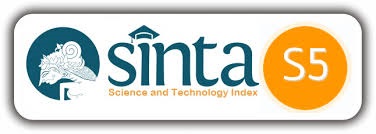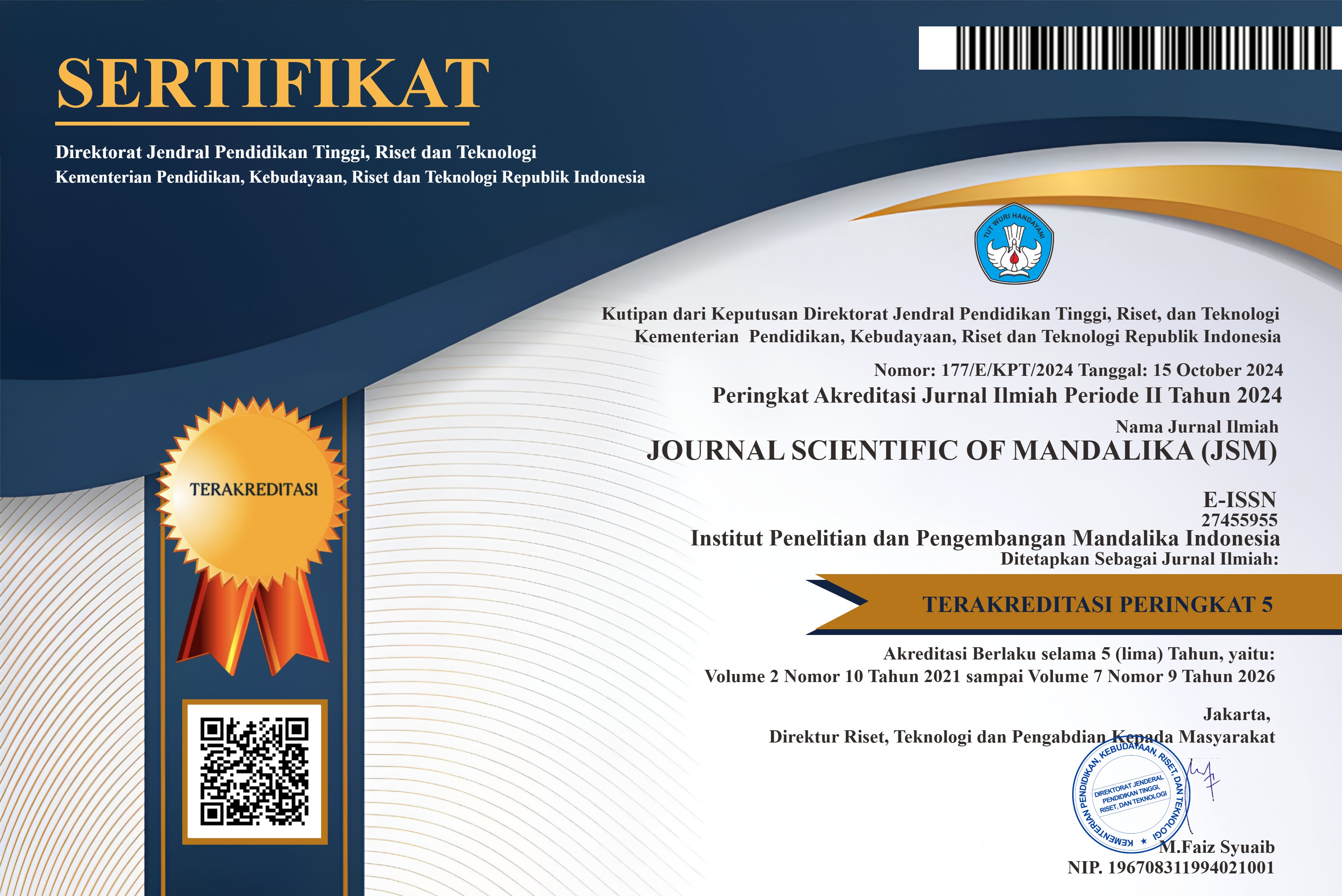Mekanisme Suplementasi Magnesium Glycinate Sebagai Terapi Adjuvan pada Pasien Depresi
Abstract
Depression is a mood disorder characterized by feelings of sadness, loss of interest, and energy deficit. Furthermore, depression can lead to cognitive and somatic disorders, even suicidal ideation. Pharmacological therapy using antidepressants such as Selective Serotonin Reuptake Inhibitors (SSRI) and Serotonin-Norepinephrine Reuptake Inhibitors (SNRI) has proven effective but has several side effects. In the last decade, attention has shifted to micronutrients such as magnesium glycinate as adjuvant therapy. This literature review analyzes the latest scientific evidence regarding the neurobiological mechanisms of magnesium glycinate in supporting the management of depression. Magnesium glycinate works through several mechanisms; N-Methyl-D-Aspartate (NMDA) receptor antagonism to prevent excitotoxicity; modulation of monoamine and Gamma-Aminobutyric Acid (GABA) neurotransmitters for mood stabilization; increasing Brain Derived Neurotrophic Factor (BDNF) to support neuroplasticity; modulation of the hypothalamic-pituitary-adrenal axis (HPA axis); reduction of proinflammatory cytokines. Magnesium glycinate has high bioavailability and good gastrointestinal tolerance, making it promising as an adjunctive depression therapy and opening up opportunities for further clinical research.
References
Arancibia-Hernández, Y. L., Hernández-Cruz, E. Y., & Pedraza-Chaverri, J. (2023). Magnesium (Mg2+) deficiency, not well-recognized non-infectious pandemic: origin and consequence of chronic inflammatory and oxidative stress-associated diseases. Cell Physiol Biochem, 57(S1), 1–23.
American psychological association, APA clinical guideline for the treatment of depression across three age cohort, 2019
Barton, N. (2025). How Does Glycine/GABA Inhibition Exacerbate the Vicious Correlative Cycle of Sleep Paralysis and Bipolar Disorder Mania? Open Journal of Medical Psychology, 14(2), 132–141.
Bawiec, P., Jaworowska, A., Sawicki, J., Czop, M., Szalak, R., & Koch, W. (2025). In Vitro Evaluation of Bioavailability of Mg from Daily Food Rations, Dietary Supplements and Medicinal Products from the Polish Market. Nutrients, 17(5), 748.
Cioffi, C. L. (2017). Modulation of glycine-mediated spinal neurotransmission for the treatment of chronic pain. Journal of Medicinal Chemistry, 61(7), 2652–2679.
Dmitrašinović, G., Pešić, V., Stanić, D., Plećaš-Solarović, B., Dajak, M., & Ignjatović, S. (2016). ACTH, cortisol and IL-6 levels in athletes following magnesium supplementation. Journal of Medical Biochemistry, 35(4), 375.
Du, X., & Pang, T. Y. (2015). Is dysregulation of the HPA-axis a core pathophysiology mediating co-morbid depression in neurodegenerative diseases? Frontiers in Psychiatry, 6, 32.
Gao, B., Li, C., Qu, Y., Cai, M., Zhou, Q., Zhang, Y., Lu, H., Tang, Y., Li, H., & Shen, H. (2024). Progress and trends of research on mineral elements for depression. Heliyon, 10(15).
Gunawan. (2016). Farmakologi dan terapi. Edisi 6. Jakarta:Badan Penerbit FKUI
Jiang, Y., Zou, D., Li, Y., Gu, S., Dong, J., Ma, X., Xu, S., Wang, F., & Huang, J. H. (2022). Monoamine Neurotransmitters Control Basic Emotions and Affect Major Depressive Disorders. In Pharmaceuticals (Vol. 15, Issue 10). MDPI. https://doi.org/10.3390/ph15101203
Kawai, N., Sakai, N., Okuro, M., Karakawa, S., Tsuneyoshi, Y., Kawasaki, N., Takeda, T., Bannai, M., & Nishino, S. (2015). The sleep-promoting and hypothermic effects of glycine are mediated by NMDA receptors in the suprachiasmatic nucleus. Neuropsychopharmacology, 40(6), 1405–1416.
Kim, I.-B., Lee, J.-H., & Park, S.-C. (2022). The relationship between stress, inflammation, and depression. Biomedicines, 10(8), 1929.
Kumar, A., Mehan, S., Tiwari, A., Khan, Z., Das Gupta, G., Narula, A. S., & Samant, R. (2024). Magnesium (Mg2+): Essential mineral for neuronal health: From cellular biochemistry to cognitive health and behavior regulation. Current Pharmaceutical Design, 30(39), 3074–3107.
Kuphal, G. J. (2012). Chapter 54 - Dysmenorrhea. In D. Rakel (Ed.), Integrative Medicine (Third Edition) (pp. 507-514.e2). W.B. Saunders. https://doi.org/https://doi.org/10.1016/B978-1-4377-1793-8.00107-2
Li, D. (2022). Treatment of depression from both biological and psychological aspects. International Conference on Biomedical and Intelligent Systems (IC-BIS 2022), 12458, 336–342.
Majewska, Z., & Orywal, K. (2025). Mineral Homeostasis and Depression: Implications for Prevention and Therapeutic Support—A Narrative Review. International Journal of Molecular Sciences, 26(14), 6637.
Maslim. (2019). Diagnosis Gangguan Jiwa, Rujukan Ringkas dari PPDGJ-III dan DSM-5. Jakarta: Bagian Ilmu Kedokteran Jiwa FK Unika Atmajaya
Moabedi M, Aliakbari M, Erfanian S, Milajerdi A. (2023). Magnesium supplementation beneficially affects depression in adults with depressive disorder: a systematic review and meta-analysis of randomized clinical trials. Front Psychiatry. doi: 10.3389/fpsyt.2023.1333261. PMID: 38213402; PMCID: PMC10783196.
Patel, V., Akimbekov, N. S., Grant, W. B., Dean, C., Fang, X., & Razzaque, M. S. (2024). Neuroprotective effects of magnesium: implications for neuroinflammation and cognitive decline. In Frontiers in Endocrinology (Vol. 15). Frontiers Media SA. https://doi.org/10.3389/fendo.2024.1406455
Pytka, K., Dziubina, A., Młyniec, K., Dziedziczak, A., Żmudzka, E., Furgała, A., Olczyk, A., Sapa, J., & Filipek, B. (2016). The role of glutamatergic, GABA-ergic, and cholinergic receptors in depression and antidepressant-like effect. Pharmacological Reports, 68(2), 443–450.
Razak, M. A., Begum, P. S., Viswanath, B., & Rajagopal, S. (2017). Multifarious beneficial effect of nonessential amino acid, glycine: a review. Oxidative Medicine and Cellular Longevity, 2017(1), 1716701.
Rondón Bernard, J. E. (2018). Depression: A Review of its Definition. MOJ Addiction Medicine & Therapy, 5(1). https://doi.org/10.15406/mojamt.2018.05.00082
Shahi, A., Aslani, S., Ataollahi, M., & Mahmoudi, M. (2019). The role of magnesium in different inflammatory diseases. Inflammopharmacology, 27(4), 649–661.
Tarleton, E. K., Kennedy, A. G., Rose, G. L., Crocker, A., & Littenberg, B. (2019). The association between serum magnesium levels and depression in an adult primary care population. Nutrients, 11(7), 1475.
Vink, Robert., & Nechifor, Mihai. (2012). Magnesium in the Central Nervous System. Cambridge University Press.
Wang, J., Um, P., Dickerman, B. A., & Liu, J. (2018). Zinc, magnesium, selenium and depression: A review of the evidence, potential mechanisms and implications. In Nutrients (Vol. 10, Issue 5). MDPI AG. https://doi.org/10.3390/nu10050584
Yin, L.-H., Liu, X.-P., Yi, L.-Y., Wang, J., Zhang, Y.-J., & Feng, Y.-F. (2017). Structural characterization of calcium glycinate, magnesium glycinate and zinc glycinate. Journal of Innovative Optical Health Sciences, 10(03), 1650052.
You, H. J., Cho, S.-E., Kang, S.-G., Cho, S.-J., & Na, K.-S. (2018). Decreased serum magnesium levels in depression: a systematic review and meta-analysis. Nordic Journal of Psychiatry, 72(7), 534–541.
Zhang, W., Liu, X., Xu, W., Wei, X., Zhang, J., & Wang, B. (2019). Effects of BDNF-ERK-CREB signaling pathways on cognitive function and neural plasticity in a rat model of depression. Int J Clin Exp Med, 12(6), 6684–6694.
Zhang, W., Xiong, B.-R., Zhang, L.-Q., Huang, X., Yuan, X., Tian, Y.-K., & Tian, X.-B. (2021). The role of the GABAergic system in diseases of the central nervous system. Neuroscience, 470, 88–99.
Copyright (c) 2025 Asfarina Prihandini, Jodii Arlan Kurnia

This work is licensed under a Creative Commons Attribution-ShareAlike 4.0 International License.













